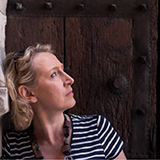A GP and volunteer for Doctors of the World discusses how the Safe Surgeries initiative supports general practices to provide care to patients, like refugees, asylum seekers, undocumented migrants, and homeless people, who are unable to provide documents.
 “No,” the GP receptionist told us. It was “not possible” for the young woman and her baby to be registered. She had just gained asylum, and was unable to produce any documents that they would accept as proof of address. Could this be right? I reviewed my rudimentary knowledge of NHS registration regulations, drawing a blank. I looked at the healthy baby and, together with his mother, considered the mountain of urgent tasks needed to get their lives back on track. After several bruising interactions with authority, she’d had enough; registering with a GP was a battle for another day.
“No,” the GP receptionist told us. It was “not possible” for the young woman and her baby to be registered. She had just gained asylum, and was unable to produce any documents that they would accept as proof of address. Could this be right? I reviewed my rudimentary knowledge of NHS registration regulations, drawing a blank. I looked at the healthy baby and, together with his mother, considered the mountain of urgent tasks needed to get their lives back on track. After several bruising interactions with authority, she’d had enough; registering with a GP was a battle for another day.
It turns out that I was not alone in my dearth of understanding of NHS policy on access to primary care. In 2017, Doctors of the World saw 1717 patients who were excluded from healthcare at their clinic. Around 20% of attempts by their caseworkers to register the attendees with an NHS GP had ended in refusal. Lack of proof of address, identity, and immigration status were the most common reasons.
In fact, NHS England takes an enlightened approach. Their guidance points out that immigration status is irrelevant to registration with a GP and that lack of proof of identity or address “would not be considered reasonable grounds to refuse to register a patient.”
Shortly after this, I found myself working at Cape Hill Medical Centre, a practice with a strong history of working with marginalised communities. Situated in a deprived area, our patients originate from over 50 countries and speak an array of languages. I have access to (clinical commissioning group funded) telephone interpretation at the reception desk. We ask for, but never demand, proof of address or identity. We work with patients to accept what proof they can provide. Crucially, we recognise that some, often with good reason, are afraid to share their address with anyone connected to the state. Initially, this confused me—surely confidentiality between patient and doctor is sacrosanct in all but extreme circumstances? Sadly, a memorandum of understanding (MoU) between the Home Office and NHS Digital allowed non-clinical patient details to be accessed for purposes of deportation and immigration detention. In 2017 alone, NHS Digital shared the data of 3000 patients in this way. Though this arrangement was largely withdrawn last month, we remain alert to the ongoing threat posed by the intention to reinstate an “improved” MoU. Fortunately, at practice level, there are several legitimate mechanisms to resist this intrusion into doctor-patient confidentiality. All this good practice is encompassed in the Safe Surgeries Toolkit developed by Doctors of the World. Cape Hill was the first practice in the west Midlands to sign up to this initiative. It has reinforced our existing policies and, in joining the Safe Surgeries network, we are signalling our commitment to good healthcare access for all.
Joining this practice has been a crash course in what equitable access can achieve for socially excluded patients and for the practice. The patients who reach us can have defensive exteriors. Presentations with severe headaches and blackouts conceal asylum cases rejected for want of proper legal advice. Backaches are caused by sofa surfing and weight loss by absolute destitution. A carefully worded letter and a connection to link workers with immigration knowledge can help reopen an asylum claim, access destitution funds, and hopefully help improve physical symptoms. I encountered a traumatised and trafficked young woman, left for months with an error in her Home Office documentation, and without her asylum ID card. She deserves the best the NHS has to offer to help her heal from her experiences. She needs the trust that comes from the continuity of care offered by a good GP, not the second class service offered to the temporarily registered, or the fragmented care of walk-in centres and emergency departments. She was turned away by many practices.
Some years ago, we experienced an influx of new patients housed locally while claiming asylum. As a result, we developed solid practice protocols, high quality social prescribing delivered by skilled link workers, clinical expertise to map and manage their needs, and institutional know-how across reception, administrative, and clinical teams, with mutually supportive relationships with local third sector organisations tackling a range of social matters. Research confirms that practices that actively evolve to meet the needs of their patients thrive. Being well equipped to offer a hand out of the darkness of the hostile environment has produced benefits for all our patients, no matter their immigration status.
Doctors of the World’s volunteers need your support: please give generously
-
£135 buys a medical backpack for a mobile medic working across Europe
-
£240 can help 300 mothers in Yemen test their children for malnutrition
-
£325 could pay for five vulnerable people to see a volunteer doctor at a UK clinic
Donate online: www.doctorsoftheworld.org.uk/BMJ
Donate by phone: 020 7167 5789
Registered charity number 1067406
Elizabeth Bates is Doctors of the World GP champion for Birmingham and an associate GP at Cape Hill Medical Centre, Smethwick.
Competing interests: None declared.
